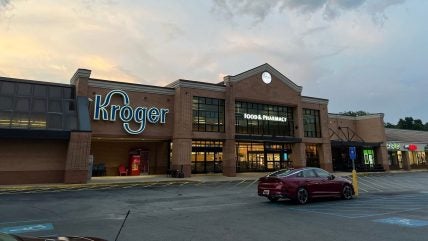
The fate of perhaps the most eye-catching M&A deal in US FMCG in recent years is set to be heard by a judge, a development that comes as no surprise but that has, nonetheless, sparked fierce debate.
Last week, US competition officials at the Federal Trade Commission (FTC) moved to block the merger between Kroger and Albertsons, two of the country’s largest retailers.
It’s been 16 months since Kroger and Albertsons first announced their plan to combine and create the second-largest food retailer in the US behind Walmart.
Almost from the outset, the proposed deal has had its critics, in advocacy and union circles at first but, increasingly, political opposition has emerged.
Kroger and Albertsons, likely reading the room, moved in September to reshape the deal, setting out plans for store disposals.
But none of that appears to have washed with the FTC, which came out swinging last Monday with the opening of its legal manoeuvre to stop the merger, arguing the transaction would hurt staff and customers.

US Tariffs are shifting - will you react or anticipate?
Don’t let policy changes catch you off guard. Stay proactive with real-time data and expert analysis.
By GlobalDataBoth Kroger and Albertsons have hit back, insisting that stopping their plans would only strengthen the likes of Amazon, Costco – and Walmart. Kroger said the combined company had committed to investing $500m to lower prices, another $1.3bn to “improve” Albertsons’ stores and a further $1bn to “raise wages and comprehensive benefits”.
“We look forward to presenting our arguments in court,” an Albertsons spokesperson told us.
The United Food and Commercial Workers International Union (UFCW) said it “applauded” the FTC’s move.
It added: “This is a step in the right direction for building a better food system in this country. Now we need to do all we can to help defend this decision and to turn the discussion towards building a better system that is more accountable to workers, shoppers, and the community.”
Neil Saunders, the head of the retail practice at GlobalData, Just Food’s parent, believes the FTC has taken “a very theoretical and ideological position that centres around its general ‘big is bad’ thesis”.
Pointing to Walmart, Saunders suggests the regulator’s belief that prices would rise in the wake of the merger was “not based on solid evidence”.
“This perspective is largely false as current market dynamics show. Walmart, which is the largest food retailer in the US, is extremely focused on price and acts as a general check on pricing. It is joined in this task by others including the dollar stores, discount chains like Aldi, and a range of regional banners. Amazon, too, which is growing its share via selling things like household essentials and grocery staples online, is another safety valve in the grocery system. With this degree of competition, a merged Kroger and Albertsons poses few threats.”
Nevertheless, given the publicly stated positions FTC chair Lina Khan has taken on previous grocery mega-mergers, the move to block the deal doesn’t come as a surprise.
As Just Food’s US columnist Victor Martino presciently reported in September, Khan was likely to be sceptical about the Kroger-Albertsons deal, principally due to the store disposals plan they have.
The two retailers want to sell more than 400 stores to C&S Wholesale Grocers. Under the terms of the agreement, C&S Wholesale Grocers would buy 413 stores, eight distribution centres, two office sites and five private-label brands. The assets are located across 17 US states and the District of Columbia.
As Victor reported, in a 2017 paper in the Harvard Law & Policy Review, “Market Power and Inequality: The Antitrust Counterrevolution and Its Discontents”, Khan used the Albertson-Safeway deal as a case study on how not to design divestiture packages to win backing for big grocery mergers.
To get that deal through, Albertsons and Safeway agreed to sell 168 stores, including 146 alone to small supermarket chain Haggen. Months later, Haggen, which went from 18 stores to 164 units, filed for Chapter 11 bankruptcy. “Underscoring how the remedy backfired, Albertsons ... reacquired a number of the stores it sold through the bankruptcy process,” Khan wrote in the 2017 paper.
The FTC, meanwhile, has also this year flexed its muscles in other areas, including notably embarking on an anti-trust suit against Amazon.
GlobalData’s Saunders concedes competition in “some local markets” could be affected by the planned combination of Kroger and Albertsons but believes store disposals could be a remedy. “From a broader national perspective, a combined Kroger and Albertsons does not pose any major threat to the competitive dynamics of the market,” he argues. “Indeed, it can be argued that scale is necessary to deliver the very low prices and investments that consumers demand. Grocery is a very low-margin business where volume prerequisite for delivering what the market wants.”
The debate over the merits (or otherwise) of the planned merger will now head to the courtroom.
“We have long held that the merger would face insurmountable regulatory scrutiny, thus to us, the decision was not unexpected,” Dan Wasiolek, senior equity analyst at US financial-services group Morningstar, says. “While the timing of future litigation and the ultimate court ruling remain uncertain, we still view the proposed deal as unlikely to close.”
And let’s not forget that the bid by Kroger and Albertsons to join forces has come at a time of heightened political interest in food prices in the US. According to government data, US shoppers are spending over a quarter more on their groceries than in 2020.
So, we now await the next chapter in the Kroger-Albertsons story to hit the courtroom… just as the US gears up for a Presidential election.




